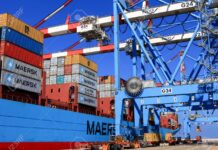As the coronavirus crisis continues to wreak havoc across the globe, and countries face a new surge of infections and contemplate the possibility of localised lockdowns, businesses are on tenterhooks, and foreign direct investment (FDI) is expected to fall by more than 30%.
FDI will play a crucial part in nearly every country’s economic development strategy post COVID-19, and for good reason. It creates jobs across sectors, it provides investment in communities and, more importantly than ever, it creates links between places and people forging strong cultural ties.
COVID-19 may have stopped global movement in its tracks, but the United States is adapting its rules and regulations to overcome the many obstacles posed by the crisis. Several governments have introduced strict public health measures causing severe economic disruptions and the pandemic has affected FDI inflows from Europe, but there are positive signs on the horizon. So, where is open for business?
Iowa’s economy is slowly gaining strength, and as of September 4th, all state-wide travel restrictions have been lifted. The outlook is improving in many of the state’s larger cities and due to the financial impact of the COVID-19 pandemic, the Iowa Economic Development Authority (IEDA) is gathering resources and using survey results to form public policy on recovery and growth, including generous funding for businesses. Luckily, the robust state had $800 million in reserves and a projected budget surplus of nearly $400 million at the beginning of the crisis, which will help cushion some of the loss of revenue expected next year.
The IEDA Non-Profit Recovery Fund will provide short-term relief to non–profit organisations that have seen reduced revenue and increased costs as a result of the COVID-19 pandemic. Other initiatives to promote and support business in Iowa include the Employer Innovation Fund grants. Governor Reynolds recently announced a $5 million grant to upskill Iowa’s workforce. The Future Ready Iowa goal aims to have 70% of Iowans in the workforce with education and training beyond high school by 2025. Approximately 60% of Iowa’s current workforce meets this criteria. This ambitious goal is set to attract foreign companies who require a highly educated workforce next year and beyond.
Furthermore, Reynolds allocated federal Coronavirus Aid, Relief and Economic Security Act (CARES) funds to assist non–profits economically impacted by COVID-19. The $2 trillion CARES Act provides economic relief to businesses, states, municipalities and individuals affected by COVID-19. Beyond the list of advantages the Iowan business climate provides investors, including pro-business policies and a central location, the state offers an assortment of financial assistance programmes to support foreign companies interested in expansion or various sectors.
Reynolds has allocated approximately $100 million (£75.9million) to a range of agricultural programmes to offset the impact of COVID-19 on farmers, producers and agricultural industries. Additionally, a large portion of CARES funding will directly support biofuels production in Iowa as it is at the epicentre of the renewable fuels industry. Iowa also benefits from having manufacturing infrastructure, and should be braced for a boom.
The government in Iowa is welcoming business with open arms. Unemployment rates fell from 10% in May to 8% in June, and a monthly survey of supply managers reported improving business conditions in August. The August Creighton University Mid-America Business Conditions Index, a leading economic indicator, showed that Iowa’s economy rose several points above neutral growth in August behind strong new orders and production, and climbed from 50.9 in July to 56.4 in August.
And there’s more good news. More than $1.2 billion (£.91 billion) in grants will be awarded through the Federal Aviation Administration to 405 airports across the United States, with airports in Iowa receiving a total of $23.1 million (£17.5 million). These grants will help improve the state’s airport infrastructure, enhance safety and strengthen growth in local communities, giving more reasons for foreign companies to relocate.
The COVID-19 crisis gave countries the chance to stop, and address not just the pandemic, but long-standing negative dynamics, resulting in fresh perspectives and a renewed vigour for success. If dealt with correctly, the approach post COVID-19 can serve to modernise and restructure the economy, the workforce and the business landscape. The Iowan government is tackling the challenges head-on. It is currently addressing a broad range of topics such as diversity and inclusion, education, broadband and health care which will drive innovation in all corners of Iowa and in all sectors of the economy.
There’s no doubt about it, these are challenging times. COVID-19 is the biggest disrupter most industries have ever faced. The recovery strategy requires more than just a rush back to normal, featuring tax breaks and regulatory relief for business. Now is an opportune time to address fundamental issues and foreign companies should take this opportunity to capitalise on the COVID-19 ‘new normal’. The Hawkeye State is future ready.









































